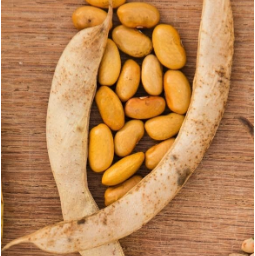Crop: Phaseolus vulgaris L. (Common bean)
The landrace called ‘Markóci’, is cultivated in the area of Markóc (Baranya County, Hungary) by a few farmers in small, separate fields, home gardens. The origin of the landrace is not known, it is cultivated for several decades in the region.
The landrace is sown in May and is flowering (with light yellow flowers) from end of June-early July. The harvest is repeated 2-3 times/year from August till the end of October. It is characterized by an aggressive climbing ability, which implies the use of high poles to sustain the plants, it is traditionally sown between corn plants. It is resistant for most diseases and has a good drought tolerance.
Cultivation System: low-input conditions.
Geographical Information
Country: Hungary
‘Markóci’ bean is traditionally cultivated in the municipality of Markóc (South-West of Hungary). The landrace is cultivated in small separated fields, for a total of a few hundred square meters.
Farmer(s) description:
Currently more than a dozen farmers are cultivating ‘Markóci’ bean thanks to the Magház community seed bank.
Propagation system: Seed, self-pollination
Multiplication procedures and consequences on landrace diversity:The common bean is a predominantly self-pollinating plant, but crosses do occur where presence of insects is high. Each farmer multiplies his own seed under slightly different agronomic conditions. The average number of plants multiplied by each farmer each year ranges from hundreds to a few thousands. At harvesting, each farmer selects seeds that will be used for the next season. Seeds are collected from healthy plants and some farmers are freezing the seeds from 5 to 7 days to avoid weevil (Acanthoscelides obtectus) contamination.
Management plan existence:The landrace management relies completely on farming activities in the area.
Added Values
It is manly produced for own consumption, but it has It has a small local niche market (direct selling from home or on farmers’ market) due to its taste and thin skin.
Others (e.g. commercial/geographical brands or special traits):Resistance, productivity and taste.
Magház community seed bank is running on farm studies with Markóci landrace. The network is also aimed at facilitating the exchange of reproduction material within the network members.
Seeds are available through the community seed bank ‘Magház’ (www.maghaz.hu)
Case study prepared by The Hungarian Research Institute of Organic Agriculture (ÖMKi), Hungary
ND
